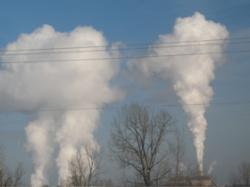 The U.S. Environmental Protection Agency yesterday announced the first-ever national standards to reduce dangerous mercury, arsenic and other toxic air pollutants from power plants.
The U.S. Environmental Protection Agency yesterday announced the first-ever national standards to reduce dangerous mercury, arsenic and other toxic air pollutants from power plants.
The agency projects that the new safeguards will prevent as many as 11,000 premature deaths, 4,700 heart attacks and 130,000 cases of childhood asthma each year. The pollutants have also been found to harm lakes, streams and fish and might even cause cancer. The new rules are likely to cut mercury emissions by 90 percent.
The new rule aimed at out-of-date power plants has been 20 years in the making and children, in particular, have paid the price for delays: More than 300,000 are born every year after being exposed to unsafe levels of mercury while in the womb, increasing their risk of having learning disabilities later on.
“Today’s announcement reminds us all that the Clean Air Act works to protect the air we breathe and save lives,” said Kassie Siegel, director of the Center for Biological Diversity’s Climate Law Institute. “Blocking or delaying these rules will lead directly to increased premature deaths, more heart attacks and increased childhood asthma and developmental delays.”
But not everyone is satisfied. Since the standards were proposed in March, the coal industry has vigorously pressured the EPA to relax the clean-air safeguards. House Republicans have already passed legislation to delay the mercury rules and loosen the requirements. And Sen. James Inhofe (R-Okla.) has promised to introduce legislation to undo the rules following today’s announcement.
Supporters believe that for every dollar spent to reduce pollution from power plants, we’ll see up to $9 in health benefits, for a total of $90 billion annually — meaning that more people will be able to stay at work and school instead of the hospital, and spend less of their money on medical bills — thus, offsetting the cost.
The White House says the rule also paves the way for tens of thousands of new jobs as power plants get up to speed with today’s technology: an estimated 46,000 short-term construction and 8,000 long-term utility jobs in the next few years.
“This is a great victory for public health,” EPA Administrator Lisa P. Jackson said during a briefing with reporters. “Coming generations will grow up exposed to lower levels of toxic pollution in the air they breathe.”



















